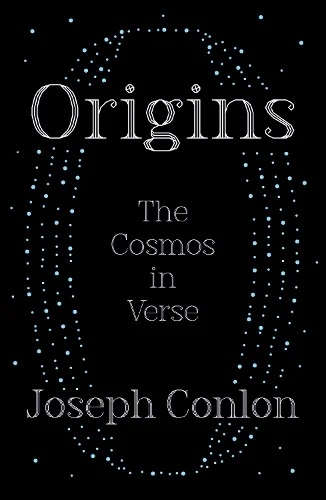The Physicist as Poet. Joseph Conlon at Oxford Literary Festival.

It is not unprecedented for science to be written in poetic form. The Latin author Lucretius composed his natural history, De Rerum Natura, in the form of an epic poem. Both Milton and Margaret, Duchess of Newcastle, wrote poetry about science. And in the Hindu culture it is frequently found too. The 5th century mathematician and astronomer Aryabhata, who wrote an extended work about mathematics in poetry, was following a well established custom.
Joseph Conlon, Professor of Quantum Physics at Oxford, has taken up this splendid tradition and composed two long poems, one Elements, about the origins of the universe and the second, Galaxies, about the whirling multitudes of stars among which our own Milky Way is only one. They are published together under the joint title of Origins: The Cosmos in Verse.

His talk today at Brasenose College included excerpts from the poems, and insights into what happened in the very important first 100,000th of a second when our universe sprang into being.
He explained how each element came into being singly, through the violent thrusting together of protons, then over a few thousand million years meeting up with other tiny sub-atomic particles with names like quarks and so on.
These are erudite yet entertaining poems that do not shy away from technical terms (quarks, neutrino etc) to express difficult scientific concepts, but ingeniously explain atomic physics and narrate the birth of the universe in the broadest language, with a tremendous range of allusion, metaphor, imagination, action and humour. The Big Bang, followed only a few hundred million years later by the emergence and evolution of the stars, is made into an enthralling story and all somehow crafted into rhyming verse.
Conlon weaves into his story personal portraits of great physicists, including some I had never heard of. One of these is Charles-Augustin Coulomb, a French engineer who discovered the electrostatic force of attraction and repulsion. Another is Cecilia Payne, an early 20th-century English physicist, who, while doing her doctoral thesis, discovered what the sun is made of (hydrogen and helium). Her supervisor at Harvard first doubted her conclusions then later tried to take credit for them himself.
All these and many others appear in Conlon's verses, rubbing shoulders across the chasms of time and space and providing a human dimension. As a speaker, Professor Conlon is full of infectious enthusiasm, and he would make a very good TV presenter of a science-themed programme.
You can buy Origins by walking into Blackwells and if you like any sort of poetry I strongly suggest that you do.
https://blackwells.co.uk/bookshop/product/9780861549115?src=1389975603&isbn=9780861549115
Or you can buy it from many other outlets, including online:
https://www.waterstones.com/book/origins/joseph-conlon/9780861549115
https://oxfordliteraryfestival.org/literature-events/2025/april-04/origins-the-cosmos-in-verse